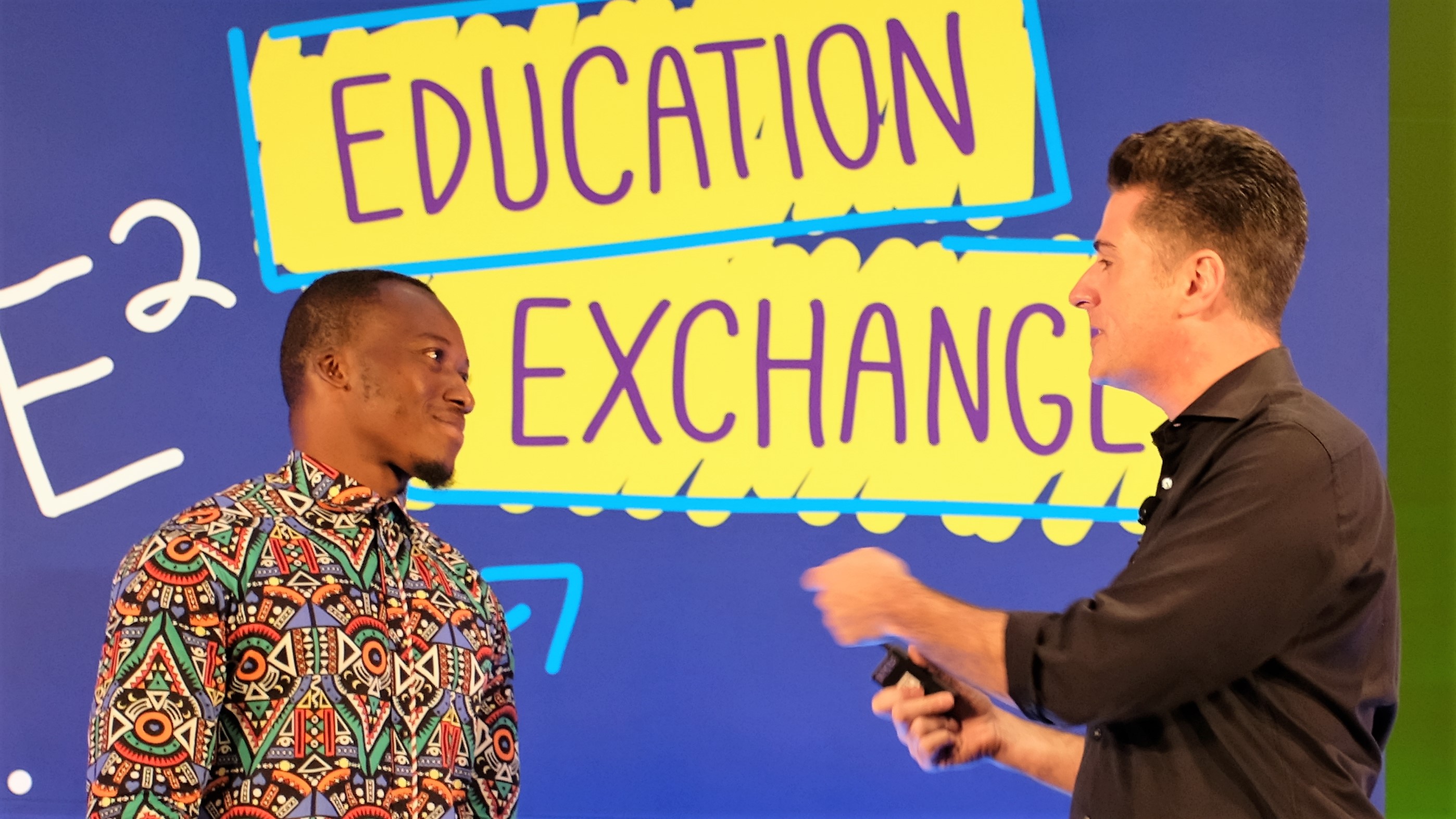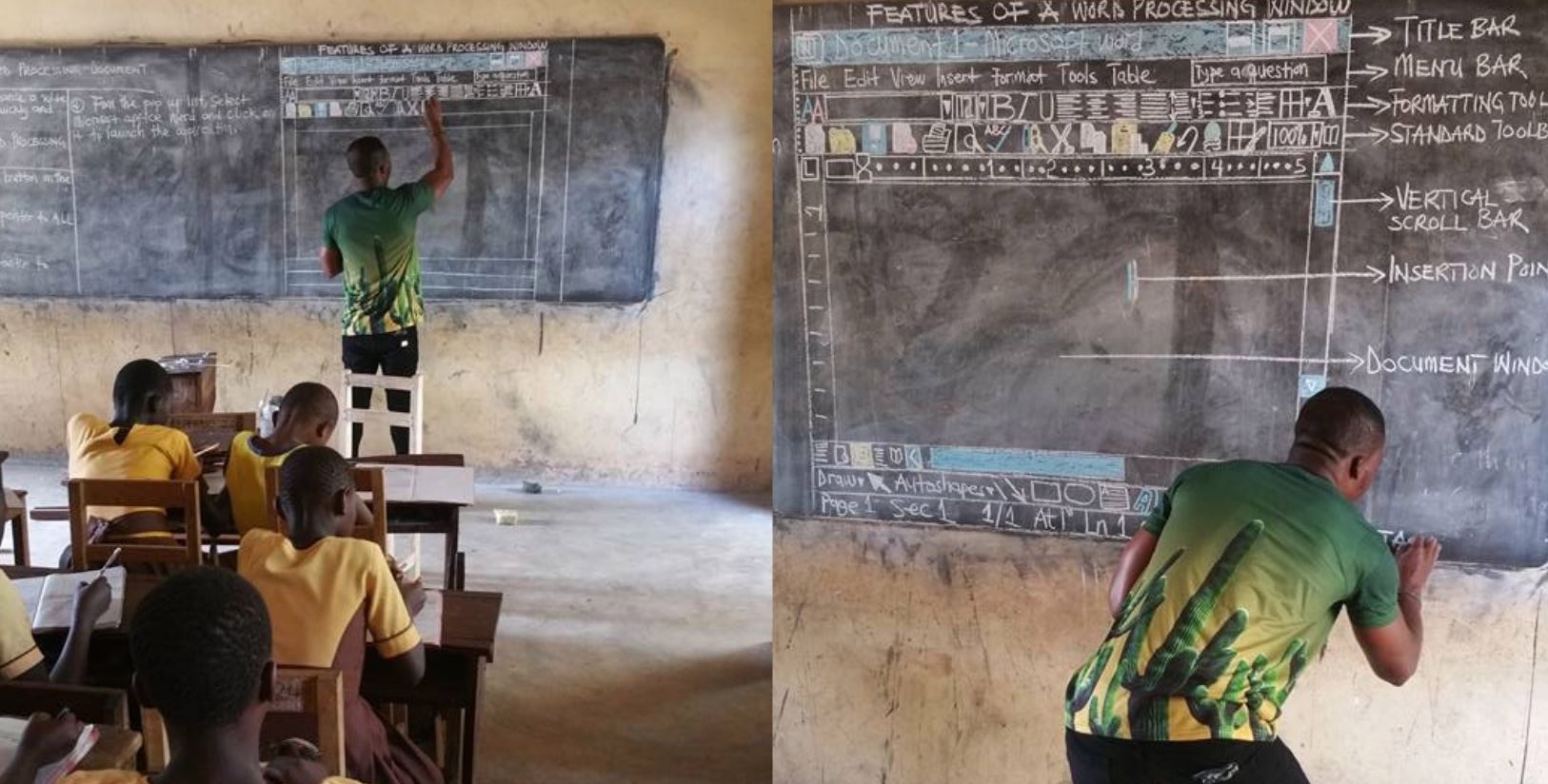
By Geoff Spencer, Microsoft Asia Writer
UPDATE: A Microsoft spokesman says: “Microsoft is committed to providing a full computer lab with initial support and training to the school and is currently in discussions with the Ministry of Education in Ghana on the most effective way to deliver this.”
A teacher who resorted to using a chalkboard in his computer studies class – because his school in Ghana had no working PCs – has been given a star treatment at an international educators’ conference hosted by Microsoft in Singapore.
Richard Appiah Akoto, 33, became a social media sensation after he posted pictures of himself painstakingly sketching out a mock-up of a Microsoft Word screen in colored chalk on his classroom blackboard so his students could learn digital skills even without devices.
He received a long ovation when he appeared on stage at the Education Exchange (E2) – a gathering of almost 400 educators and school leaders from 91 countries looking at how technology and new ways of teaching can prepare students for success in the digital age.
Anthony Salcito, Vice President, Worldwide Education at Microsoft, praised Richard as one example of the many teachers worldwide who overcome massive obstacles to meet their students’ needs every day.
“Your work has really inspired the world. It really shows the amazing innovation and commitment and passion that teachers have for helping their students get ready for the future,” Anthony said. “At Microsoft, we believe that educators are heroes and are pushing the boundaries of what is possible to transform learning and making a direct impact on the experiences and lifelong skills of their students.”
Microsoft was so impressed by Richard’s dedication and innovation that it flew him halfway around the world to Singapore – the first time Richard had ever left Ghana. Anthony said that by coming all that way to participate in E2, Richard was now part of a community of educators who share experiences and learn from one another on how to teach and engage with students.

Later, Richard said he has dedicated himself to teaching vital digital skills to his students, so they would not be left behind in life. “They have some knowledge about computers, but they don’t know how to actually operate one,” he said in an interview. But showing his class how to use a PC posed a fundamental problem as the school’s only computer and his own personal laptop were both broken.
“At Microsoft, we believe that educators are heroes and are pushing the boundaries of what is possible to transform learning and making a direct impact on the experiences and lifelong skills of their students.”
“I wanted to teach them how to launch Microsoft Word. But I had no computer to show them. I had to do my best. So, I decided to draw what the screen looks like on the blackboard with chalk,” he said. “I drew the features and labeled them correctly so that they would know what-was-what. Then I drew what you would see on your computer screen after launching Word.
I have been doing this every time the lesson I’m teaching demands it. I’ve drawn monitors, system units, keyboards, a mouse, a formatting toolbar, a drawing toolbar, and so on. The students were okay with that. They are used to me doing everything on the board for them. When I did this, it was nothing new or strange for them.”

But the rest of world thought it was something extraordinary after he posted his efforts on social media. Pictures of him drawing on his chalkboard went viral and make world headlines. As well as thousands of likes, Richard – who uses the social media pseudonym of Owura Kwadwo Hottish – got pledges of help from around the world.
Microsoft will be working with Richard through a local partner in Ghana to provide device and software support required for his students at the Betenase Municipal Assembly Junior High School in the town of Sekyedomase in rural Ghana. He will also gain access to the Microsoft Certified Educator Program (MCE) for professional development, so he can nurture his passion for teaching and build rich, custom learning experiences for his students. “Something very positive has come out of this and I am very happy. We are no longer going to use the chalkboard again. We will have computers.”





